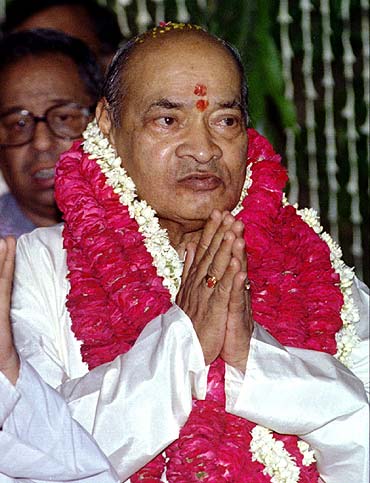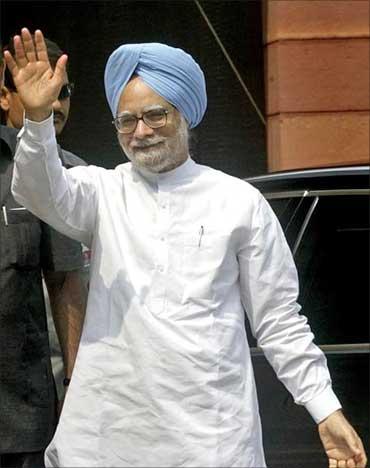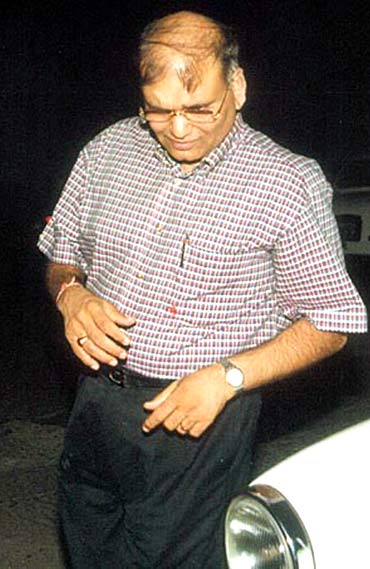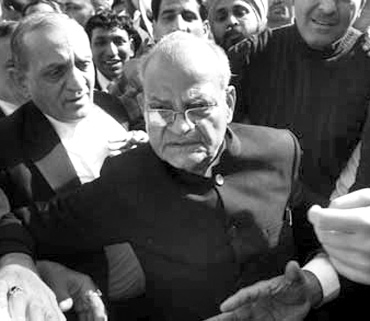This article was first published 14 years ago
Home »
News » If Narasimha Rao was our PM today
If Narasimha Rao was our PM today
Last updated on: July 19, 2011 10:43 IST
Image: P V Narasimha Rao was India's prime minister for 1991 to 1996
How would P V Narasimha Rao, who brought Prime Minister Dr Manmohan Singh to politics, have dealt with the crises the United Progressive Alliance government is facing? Veteran political commentator Kalyani Shankar assesses Rao's likely responses. Is Prime Minister Dr Manmohan Singh presiding over the most corrupt government in the history of India? Should he have dealt with the crisis more stringently? The answer to all these questions is a 'yes'.
Would Rao have handled the situation in a different way? Rao may have given a nod to setting up a Joint Parliamentary Committee to look into the 2G scam, but would have ensured to nip some problems in the bud.
Scams in India are nothing new and almost every prime minister after Jawaharlal Nehru has come under criticism for scandals that tainted their tenure. But what is mind-boggling is the magnitude of the scams that have surfaced during Dr Singh's government.
...
Image: Prime Minister Dr Manmohan Singh
Compare the Rs 1,70,000 crore-2G scam to the Bofors scam with its Rs 64 crores kickbacks. The latter, which cost Rajiv Gandhi the elections, seems rather insignificant.
The Dr Singh government is left red-faced not only because of the various scams, but also a myriad issues like black money, corruption, price rise, to mention a few. With every passing week, new scams are coming to the fore.
Undoubtedly, the 2G scam has caused the maximum damage to the UPA government. And the UPA's troubles do not end with scams.
Unlike the past, the PM and Congress chief Sonia Gandhi are now under attack from a proactive judiciary, a demanding civil society led by Anna Hazare, an aggressive opposition, a vigilant media and statutory institutions like the Comptroller and Auditor General, all at the same time.
Image: Stockbroker Harshad Mehta, who had accused Rao of taking a bribe of Rs 1 crore
Photographs: Reuters
Each PM has his/her own way of tackling scams. A number of scams surfaced during the late Narasimha Rao's tenure (1991-96).
In 1992, a year after he took over, the security scam involving big bull Harshad Mehta hit the headlines. A stockbroker, Mehta is alleged to have engineered the rise in the Bombay Stock Exchange in 1992. Exploiting several loopholes in the banking system, Metha and his associates siphoned off funds from inter-bank transactions and bought shares heavily at a premium across many segments, triggering a rise in the Sensex.
Trouble started for Rao when Mehta alleged that he had given the then PM a suitcase with Rs 1 crore cash at his residence.
Matters worsened when in July 1993, the Jharkhand Mukti Morcha leader Shailendra Mahato testified that he and three party members received bribes of Rs 30 lakh to bail out the Rao government in the 1993 no-confidence motion.
Image: Former communication minister Sukh Ram
In 1996, the Central Bureau of Investigation seized Rs 3.6 crores in cash concealed in bags and suitcases from former communication minister Sukh Ram's residence. The cash was allegedly collected by him by committing irregularities in awarding a telecom contract. He was convicted and sentenced to three years' rigorous imprisonment by a Delhi court in 2002.
In 1996, the urea scam was exposed. CS Ramakrishnan, managing director, National Fertiliser Limited, and a group of businessmen close to the Rao regime had allegedly fleeced the government. In 1995, NFL floated a tender for the supply of two lakh tonnes of urea and in 1996, Ramakrishnan, who was appointed MD by the Rao government by bypassing established procedures, advanced the entire amount of Rs 133 crore to Turkish company Karsan without any bank guarantee.
The hawala scandal surfaced in 1996.
These scams spelled doom for the Roa government, which suffered a defeat in the 1996 polls.

The UPA 2 government was elected to back to power in 2009 after winning more seats than it did in 2004. But the second term is marked with scandals --- 2G, Commonwealth Games and Adarsh Housing scams amounting to loss worth lakhs of crores of rupees to the exchequer.
In the 2G case, Supreme Court was prompted to pull up the prime minister asking him why no action was taken against the then telecom minister A Raja despite several indicators pointing to a looming scam ahead. The Niira Radia tapes had their own story to tell on matters of governance.
With corruption becoming the flavour of the current political season, Gandhian Anna Hazare brought the government to its knees on the issue of a stronger Lokpal Bill.
The government came under severe criticism when four senior ministers from Dr Singh's team -- Pranab Mukherjee, Kapil Sibal, Pawan Kumar Bansal and Subodh Kant Sahay -- went to receive yoga guru Baba Ramdev, who was protesting against black money, at the Delhi airport.
Ramdev's attempt to mobilise huge crowds on the corruption issue and the subsequent drama has put the government on the back foot.
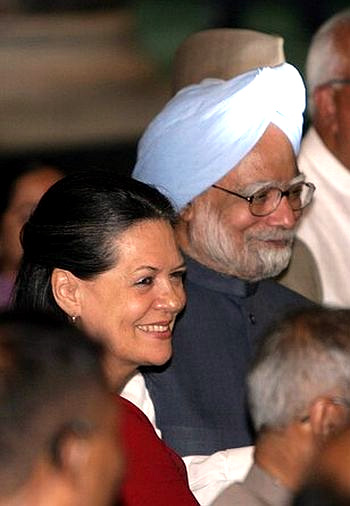
Image: Congress chief Sonia Gandhi with Prime Minister Dr Manmohan Singh
Had Rao been the prime minister today, how would he have handled this crisis of credibility?
The political situation is not the same it was in 1991-96. Moreover, the power solely rested with him, unlike today where the PM is without authority and Sonia Gandhi without accountability. Perhaps this is what is creating problems for UPA 2.
Firstly, Rao would have made sure that a line was drawn between the government and the party. Secondly, he would have thought of a political solution rather than giving knee-jerk reactions.
Thirdly, the Prime Minister's Office would have taken note of the scams before the situation blew out of proportion.
Fourthly, he would have avoided setting up so many groups of minister and left it to the committee of secretaries to resolve most of the issues.
Fifthly, he would have had a tight control over the appointment of secretaries.
Today, Dr Singh does not enjoy this authority, as secretaries owe their loyalty to either Sonia Gandhi or the various coalition partners who bring them in.
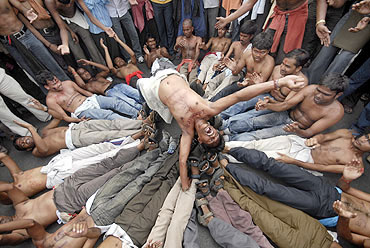
Image: Pro-Telangana students protest outside Osmania University
Take, for example, the Telengana issue. Rao may have never in the first place agreed to announce that the process of a separate Telengana would begin as the Dr Singh government did on December 9, 2009. Moreover, the former PM hailed from Andhra Pradesh and he used it to his advantage.
He always maintained that Andhra Pradesh should remain unified and would have dealt with the Telengana Rashtra Samithi chief Chandrashekhra Rao differently. Having set up the Srikrishna Commission, he might have accepted its recommendations rather than dilly-dallying on the subject.

As for the Commonwealth Games, Rao might not have allowed things to drift so far. Many people do not know that he was personally interested in sports, and was the Union minister of state, youth affairs and sports during the Rajiv Gandhi regime.
Most of our former prime ministers had a hands-on approach when it came to managing international events during their tenure. Indira Gandhi made son Rajiv Gandhi in charge of the Asian Games in 1982.
But Dr Singh showed minimal interest in the CWG and left it up to International Olympic Committee chairman Suresh Kalmadi and the sports ministry to call the shots. Rao had Kalmadi, who was a junior minister in his government, under control.
It was not as if Dr Singh was completely in the dark about the ongoings during the CWG preparations. Commonwealth Games Federation President Michael Fennel had periodic meetings with the PM and expressed his concern about the event.
Having said this, after the scam surfaced Rao would have set up a committee to inquire into the irregularities. He would have at least taken action against CWG officials and shuffled the portfolios of the sports minister and urban development minister.
The Shunglu Committee report as well as the CAG report have clearly indicated that the PMO was aware of the loot which was taking place. No doubt, Dr Singh allowed the law to take its course and bigwigs like Suresh Kalmadi are now lodged in Tihar jail but what the public wants is accountability from the political class.
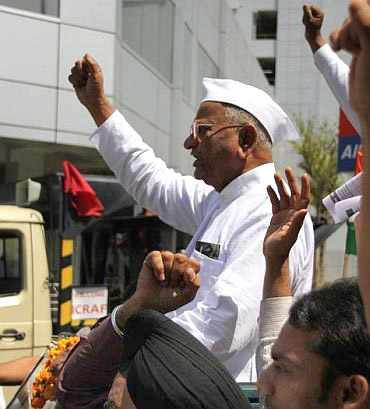
Image: Social activist Anna Hazare
As far as the Adarsh scam is concerned, it points fingers at the state as well as the Centre because the land belonged to the defence ministry. Rao would have made sure that the chief minister would step down. Ashok Chavan did quit from his post as Maharashtra CM in wake of the Adarsh scam, but no action was taken against defence officials.
Another controversy that came as an embarrassment to Dr Singh was the appointment of PJ Thomas as the chief vigilance commissioner. This despite objections being raised over the choice of the CVC.
Rao might not have insisted on the appointment of Thomas and more importantly, the PMO would have vetted the candidates for the PM's perusal.
He would have had a different approach towards Anna Hazare and his movement. He would have neither let Hazare become a large-the-life personality nor would he have agreed on making the civil society a part of the Lokpal Bill drafting committee.
Having said that, it is also true that no two prime ministers can conduct themselves in the same way. Indira Gandhi did not emulate Nehru, Raijv Gandhi had his own style of functioning and Rao did not follow Rajiv Gandhi's footsteps. But Dr Singh does not have a free hand on two counts. One is that Sonia Gandhi is above him, and secondly, his government is a coalition government.
In short, each prime minister has his own way of wriggling out of a mess, but Dr Singh is at the receiving end today only because of the way he is tackling the problems at hand.
